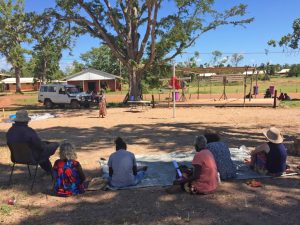About REC-IER
The Remote Engagement Coordination – Indigenous Evaluation Research (REC-IER) project is funded through the NTG Department of Housing and Community Development. CDU researchers have worked collaboratively with Indigenous research organisations, researchers and knowledge authorities to clarify local understandings and imperatives of good engagement and coordination, and to develop processes for giving feedback to government on their engagement and coordination activities in remote Aboriginal communities.
Remote Engagement and Coordination Project Objectives
- Understand how communication between government and remote community members can be improved
- Create community specific strategies for evaluating the engagement and coordination performance of government in the four project locations
- Identify approaches to engagement and coordination evaluation that may be of use in other NT communities.
Indigenous Evaluation Research Project Objectives
- Ascertain the capacity of remote community based research groups in four project locations and identify what is needed to make them sustainable.
- Develop localised research and evaluation capacity in four remote community project locations
- Recommend potential research arrangements where a locally based group is not sustainable.
The Research Sites were Ali Curung, Galiwin’ku, Ngukurr and Ntaria. Part way through the project research was discontinued at Ali Curung as proceeding under the guidance of a local research group did not seem feasible at this time.
The GroundUp Research group at the Northern Institute, Charles Darwin University worked on the project in conjunction with local Indigenous researchers from each of the project locations, and a Steering Group from government.
Our Methods
Our methods have involved working under the guidance of Elders in each of the project sites, and working collaboratively with small teams of local Indigenous researchers.
Local project teams initially developed means for consulting with other community members, listening to their stories and learning about what was important in their engagement with government.
Beyond this, they have also developed site specific means for giving feedback to government on their engagement, including through ongoing community consultation, engagement scorecards, and use of video footage.


